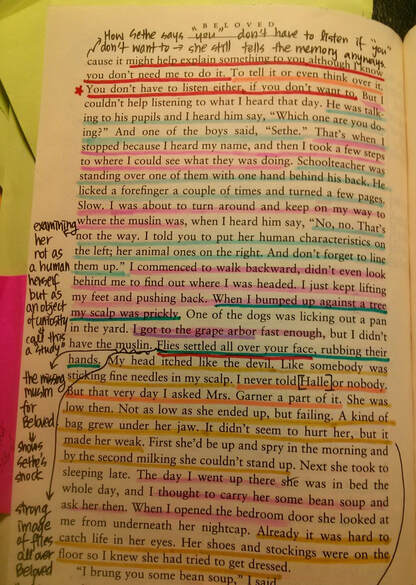 Starting at around the age of 12 or 13, I decided if I wanted to be a writer, I had to STUDY the writing of those I admired like Alice Walker, Toni Morrison, Maya Angelou, Ntozake Shange, Toni Cade Bambara, Lorraine Handsberry, Gloria Naylor, Margaret Walker, Dorothy West, Jamaica Kincaid and the list goes on and on. So, I would take my meager allowance and I would buy two copies of a book. One to read and look pretty on the shelf, and the other to study. And I mean STUDY. My 12 or 13 year old self felt certain that there was a code, and if I studied these amazing, phenomenal writers enough, I could break that code. I just had to be patient and studious, and I was both. The first time I read Alice Walker's book, The Color Purple, I had never heard of a style of writing called epistolary before. But when I read articles written by scholars who discussed the book, I realized her novel was evidence that writers had multiple ways of telling a story. Then I started reading with the intent of finding out how other writers decided to convey the story they were telling. I looked for point of view even before I understood what the term meant. I would ask questions in the margins. "Why did Gloria Naylor end the scene here?" "Toni Cade Bambara uses language in a way I've never seen in stories before. These characters sound like my cousins from up North. What does this add to the stories? How can I use the rural dialect of my family and friends in my stories?" "Maya Angelou sounds like she is from home. Do you mean people can write books about regular folks?" "Ntozake Shange's writing always sounds like songs. Songs I've heard on the radio or in church or underneath the pecan trees where J.W. Warren played blues harmonies way into the morning hours of a Saturday. Why did she choose to write in this manner? What does this musicality bring to the stories she is telling? How would the stories be different without it?" Yes, my 12 or 13 year old self was intense. My books were my friends, and I wanted to know everything there was to know about them. I wanted there to be no secrets between us, so I studied, I pushed, I prodded, I cajoled, I yelled, I screamed, I cried, I swallowed those books whole, hoping one day I could repurpose what I had swallowed into sentences, paragraphs, pages, and chapters of my own that remotely resembled the prose I found in my favorite books. If you are not regularly engaging with the texts of those who are successful writers, then you are not doing the work necessary to decode the process. If you are not asking questions of every powerful book you read, then you are missing the boat completely. Becoming a great writer, means studying great writers. Once a student said to me, "I don't like to read the work of others because I don't want to be influenced by their style." I looked at that boy like he was out of his fool mind. Imagine an up-and-coming basketball player saying, "Oh, whenever I see LaBron is playing, I turn off the television because I don't want to ever accidentally emulate one of his moves." Come on! It takes a lot of arrogance to think if you read August Wilson's plays that all of a sudden you will become August Wilson. Never. BUT what you will become is someone who is more aware of the human condition, and that will aid you in your writing, and don't we all want that for our writing? I had never heard of a BFA or MFA in Writing when I was 12 or 13, BUT I did understand the necessity of studying. I was an Honor student. I worked hard to make those "A's" and I knew the process was not passive, it was aggressive. SO breaking those texts apart, made absolute sense to me. I did it every day when I studied science or history or government. Becoming a successful writer (and I don't mean monetarily), involves deep analysis of your work, but more importantly, deep analysis of the work of others. There are no shortcuts. You have to do the work and the work can be tedious and time consuming, but at the end of the day, you will be a better writer, and THAT should be the goal. Period.
0 Comments
Leave a Reply. |
Archives
March 2021
Categories
All
Blog Roll
|
 RSS Feed
RSS Feed







